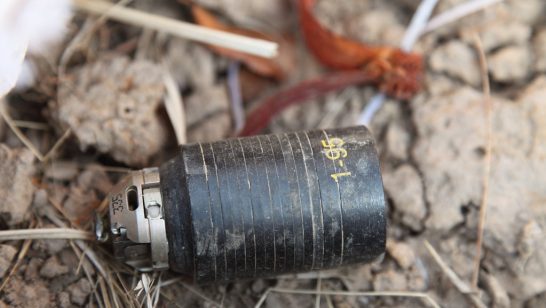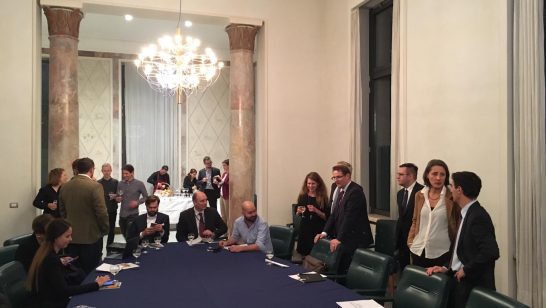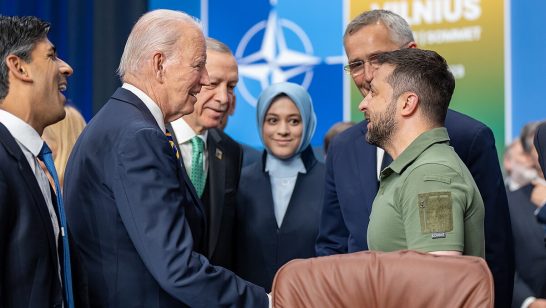On the one-year anniversary of Russia’s full-scale invasion of Ukraine, we are sharing some of the analyses and activities recently undertaken by members of the European Leadership Network.
In a meeting of Network members earlier this week, we took stock of the war one year on. Some of our Ukrainian members told their colleagues from across wider Europe that most Ukrainians currently believe they need to win the war militarily; that they don’t see a diplomatic solution as feasible, because they don’t think Russia is willing to have one; and that future security guarantees will be key.
Undoing the damage of the invasion will take at least a generation, it was said. But it was vital for the world not to continue down a route where force, and above all the threat of nuclear use, were seen as the way to achieve political goals. One speaker emphasised that the result of this war logic would be further nuclear proliferation and higher existential risk, to the detriment of all countries, including Russia.
European solidarity
In an article for Le Monde, former Polish defence minister and senior network member Bogdan Klich articulates a view that is widely held in Europe, especially in eastern European countries: ‘If we don’t help the Ukrainians today, no one will be able to help us tomorrow’
Italian thinktank director and senior network member Nathalie Tocci writes for La Stampa that Putin inadvertently resurrected NATO and EU enlargement, which had until recently been shelved. In a similar vein, former Spanish foreign minister and senior network member Ana Palacio writes in El Mundo that Europe has woken from a stupor, and has shown unity that seemed unthinkable just over a year ago. These were among the unintended consequences of the invasion.
Senior associate fellow and former senior NATO official Stefanie Babst argues Germany needs to put stronger support behind Ukraine. In a glimpse into the less well-documented political spillover effects in Poland, YGLN member Bartosz Rydlinski writes about the response of the centre left to the war. He highlights the efforts of Polish city mayors and local representatives in welcoming refugees but noting that for social democratic parties, a tradition of scepticism about military and defence spending is being challenged in the new geopolitical context.
Meanwhile, Economist Intelligence Unit director of global forecasting, and member of the Younger Generation Leaders Network, Agathe Demarais, asks what the West has learned from one year of coordinated sanctions on Russia.
Debating diplomatic options
Zachary Paikin, researcher at the Centre for European Policy Studies and executive committee chair of the Younger Generation Leaders’ Network, writes for Italian thinktank ISPI on creating space for diplomacy to end the war.
Senior network member and European Parliament foreign affairs committee chair David Mcallister speaks in this interview of the need to reach a peace, but not one that is solely dictated by Russia.
Meanwhile, senior network member and Italian member of parliament Piero Fassino writes for HuffPost Italy that in theory there could be a solution based on Ukraine staying out of NATO but being integrated into the EU with Western security guarantees. Such a solution could be accompanied by renewed diplomacy on European security architecture and US-Russia arms control. But this is currently unworkable, he goes on to say, because Russia has occupied and annexed Ukrainian land and is now threatening Moldova.
Global implications
Senior network members and former NATO secretary-general Javier Solana reflects in an op-ed for Project Syndicate on the future of global interdependence. The invasion has made it clear that economic interdependence does not guarantee peace, and this thinking has to be revised.
Senior network member and former French ambassador Michel Duclos has edited a new book, War in Ukraine and a New World Order [French]. In an interview with L’Opinion he argues the West needs to better understand global opinion on the war, or risk being isolated.
In a debate earlier this month in the UK House of Lords, senior network member and former chair of the joint intelligence committee Pauline Neville-Jones asked whether Europe is moving towards an attempt to resume cooperative security in Europe – as she hoped could be the case – or dealing with an attempt to contain Russia and prevent more damage.
In the same debate, senior network member and former British ambassador to the UN, David Hannay, spoke about accountability, international law, and hearts and minds in the global south, and ELN Chair Des Browne ELN chair Lord Browne said that “in Euro-Atlantic security—strategic stability in the space between Vancouver and Vladivostok—now is always the time to plan for the longer term”.
In the coming months, Network members and other writers for the ELN will continue to look ahead, at the changes underway in international security following the invasion, and at the strategic choices that will shape them.
The opinions articulated above represent the views of the author and do not necessarily reflect the position of the European Leadership Network or all of its members. The ELN’s aim is to encourage debates that will help develop Europe’s capacity to address the pressing foreign, defence, and security policy challenges of our time.
Image: Wikimedia Commons / Mhawk10



